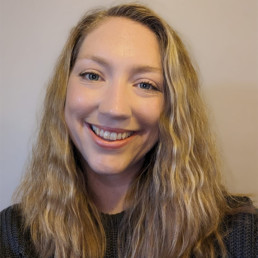
Written by Becky Shewell
My name is Becky Shewell and I am a Qualified Teacher of the Deaf, graduating with an MSc in Deaf Education with Distinction from The University of Manchester in 2023. I am the creator and founder of The Shewell IntersectionaliTREE, a database of books with positive and incidental role model representation, so children can see themselves to be themselves.
Often, when people think about their identity, the ‘big’ categories spring to mind. Their gender, sexuality, ethnicity, belief systems and so on. Of course, these form our identities, but during my time running workshops and talks as creator/founder of The Shewell IntersectionaliTREE, I’ve concluded that identities are much more nuanced than this. I usually start my workshops asking people to name five words they identify with and what surprised me is that often, people name traits related to their day-to-day lives. Words like dog-lover, vegan, mother, educator, singer and so on. I found this fascinating, as I didn’t expect this, thinking they would choose words that fall into much broader categories.
As for me, I identify as a queer, disabled woman but I do not necessarily identify by those things first. I am also a cyclist, sister, partner, creator and educator. The second set of traits are those which I embody on a day-to-day basis, that I really relate to. They are linked to the fact that I’m a queer, disabled woman because those overarching identities play into the life that I have shaped, and that has been shaped for me by external factors. I am a cyclist, because this is a low impact sport that I can participate in, as I have a form of hip dysplasia that stops me from being, say, a runner. I am a sister, which is a large part of my identity as a woman. A creator, because I have experienced challenges as a queer woman and an educator, because of the privileges of growing up in a loving environment and wanting to give that back. This is what speaks to me when I think about intersectionality and when I develop content to support our intersectional young people, through The Shewell IntersectionaliTREE, a library database of books with diverse, intersectional characters that our young people can relate to.
Our identity is not made up of single, fixed categories, but how these play out to create deeper, more meaningful traits that we really share when we want somebody to know about us and what makes us tick. It is a result of how all these intersecting identities shape us over time, as well as the social factors that have granted us privilege and power or discrimination and marginalisation.
Bronfenbrenner’s Ecological Systems Theory (1977) (Bronfenbrenner’s Ecological Systems Theory) even goes as far to draw into question how much our belief systems are really a choice, and not just shaped by our experiences, such as the family, place and opportunities we are born into. Indeed, our environment has a high impact on us; shaping our world view, choices and how we interact with each other. This was a focus on the PDGipEd/MSc Deaf Education course at The University of Manchester, where we considered differing parental views, to ensure the best care possible.
So, when we think about identity, are we thinking about it in a nuanced enough way? I think now, we are doing a good job of presenting a diverse range of characters on media platforms with d/Deaf and disabled characters on soap shows like Waterloo Road and Eastenders, queer shows like Heartstopper readily available on Netflix and a wide range of storybooks with intersectional representation in the mainstream bookstores. Yet, in a recent Masters project I carried out, participants found that the portrayal of these characteristics, or identities, is very much focussed on the identity trait and usually one identity trait, rather than a more nuanced and intersectional approach. For example, in d/Deaf storybooks, the focus is often on the fact that the character is d/Deaf and how the character could manage this. But being d/Deaf isn’t the entirety of somebody’s personality. They could also be interested in superheroes, or have two mums, or go to India for Diwali each year and this might be just important to them. Being d/Deaf is a part of their experience, which doesn’t necessarily need to form the whole of the plot line and perhaps, could be more powerfully represented as a part of their experience.
There is a rise of books with this type of incidental representation; for example, where the plot may be about a d/Deaf character having adventures as a superhero, and they just happen to take out their hearing aids for bedtime. Does this not give our diverse children and young people a chance to feel normalised, to see themselves reflected in positive, everyday role models for better self-esteem? I think, in our world, we are in danger of polarising and simplifying people too much. Why not recognise that we are nuanced and complex individuals, with a range of feelings, experiences and characteristics; both good and bad? I think this would encourage young people, and wider society, to develop more acceptance and understanding both within and outside of themselves; preventing narrower, polarized viewpoints that, I feel, seem to pervade the current mainstream media.

